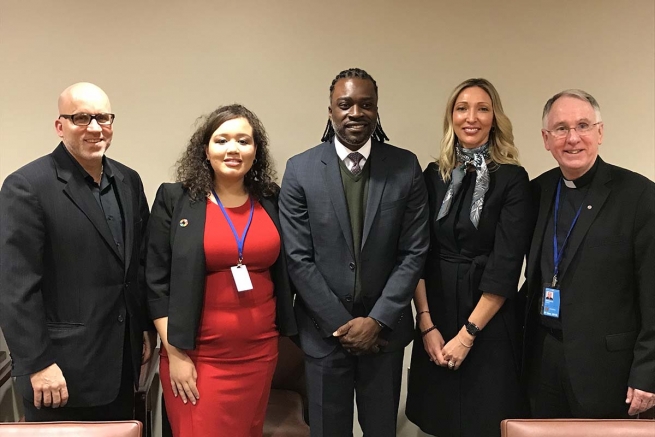by Fr. Thomas Brennan
The event was one of the Salesian contributions addressing the priority theme for the 2018 policy cycle of the Commission: “Strategies for eradicating poverty to achieve sustainable development for all”. Participating from the Salesian Family were the Provincial of the Unites States East and Canada (SUE), Fr Timothy Zak, representatives of the House of Formation, of the "Don Bosco Community Center" in Port Chester, and of the "Don Bosco Cristo Rey" center in Washington, as well as Fr Tom Brennan, SDB, who organized the event and presented to the Commission a written paper on youth employment, available, in English, at the following link: http://undocs.org/E/CN.5/2018/NGO/40
The interactive panel addressed youth employment as a key factor in achieving the ambitious agenda set forth in the 2030 Agenda with an emphasis on Sustainable Development Goal 8 which addresses decent work for all. Youth employment is explicitly promoted in 8.a: By 2020, develop and operationalize a global strategy for youth employment and implement the Global Jobs Pact of the International Labour Organization.
Panelists: Gregg Croteau, Executive Director, UTEC, Cristal Cruz, Good Shepherd Services, Lyndell Pittman, Director, Youth Employment for homeless and at-risk youth, Covenant House, Amber Barth, Senior Programme Officer, ILO, Fr. Tom Brennan, S.D.B., Moderator.
Amber Barth of the ILO presented a global overview of youth employment noting that the global youth unemployment rate is on the rise after a number of years of improvement. She pointed out that work prospects for many young people still keep them in poverty, and that for young woman finding a quality job is more difficult than for young men.
The other panelists focused the discussion on assisting young people they work with who might otherwise be neglected: the homeless, the addicted, school dropouts, the gang or court involved, those struggling emotionally. The effective programs in the United States were presented as examples of how to respond to the needs of struggling youths in a given context. Participants were encouraged to develop similar programs to respond to the needs of youth in their own country, context and culture.
Research has shown that unjust economic, political and social structures perpetuate a growing disadvantage for youth employment and empowerment causing them to be truly “left behind”. With many years of experience in direct service work with disadvantaged youths, the panelists spoke with conviction, passion and hope that those marginalized and pushed aside would no longer be left behind. Rather, the worth and dignity of all was stressed. The panelists all spoke of the importance of strong partnerships within a community if one was to be successful in integrating young people into the work force. Job availability is not enough. Large numbers of young people are working, but do not earn enough to lift themselves out of poverty. Additionally, young people frequently work involuntarily in informal, part-time or temporary jobs. Youth are now showing a higher incidence of working poverty than adults.
To assist young workers to find their way to long term sustainability, we must take a holistic approach. It has been demonstrated that ongoing mentorship, skills training and counseling services are essential components of successful programs. With these supports in place, young people have been more equipped to develop a sense of purpose and a sense of a future. Cristal Cruz, of Good Shepherd Services, noted that this helped her develop social and networking skills that, she said, “I didn’t know I was capable of.”
With social isolation, fractured families and violence becoming more prevalent in communities that are populated by large numbers of people living in poverty, the challenges of preparing young people for the world of work have become more complex. As Gregg Croteau, UTEC, noted disenfranchised youths do not have the “social airbags” that more affluent kids have protecting them if they make a mistake. More economically stable families tend to have more attentive parents, greater family stability, good teachers — and even more friends and acquaintances. “A lot of poor kids don’t have any access to help. …When a kid living in poverty hits a roadblock, is anyone there to help?” Some places have programs like UTEC, Good Shepherd Services and Covenant House, many do not.
The empowering of disenfranchised youths and preparing them to enter the work force presents more challenges than those living in stable homes or in peaceful nations. This calls for persistence on the part of leaders and educators. It demands that we not give up on troubled youths. UTEC’s approach is one that many would find to be difficult to follow. However, they have been successful because they adhere to it tenaciously. As Gregg said, “We are not a second chance program, we are an 8/9 chance program. We anticipate relapse and keep the door open for youth. We want to create a safe place to fail, so that they can bounce back after a defeat.”


